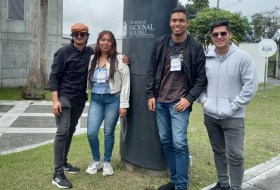News
The Quantum Computing Hackathon highlights the development of Unicauca students
Jessica Lasso, Daniel Oñate, and German Díaz, from the Physics Engineering program, along with Juan Diego Vergara, a teacher and student in the Master's in Physics Engineering at the University of Cauca, developed an optimization algorithm using quantum computing, which offers greater advantages compared to classical computing.
The students from the Physics Engineering program, Jessica Lasso, Daniel Oñate, and German Díaz, together with Juan Diego Vergara, a teacher and student in the Master's in Physics Engineering at the University of Cauca, secured third place in the quantum computing hackathon contest. The students and the teacher solved an optimization problem by developing a quantum algorithm to find the shortest total travel distance between multiple points, minimizing cost and total time.
The quantum computing hackathon contest was held during the quantum computing workshop organized by the National University of Colombia, Manizales branch, and the Colombian Society of Physics Engineering within the framework of the VII National Congress of Physics Engineering, which took place from October 22nd to 27th, 2023.
Regarding the topic addressed in the contest, the professor and Coordinator of the Physics Engineering program, Diego Fernando Coral Coral, explained that the problem to be solved using a quantum computing algorithm involved optimizing the "traveling salesman problem"; where there are several cities and a car that must travel from one city to another covering the minimum distance in the shortest time possible.
"For this particular case, a series of steps were designed to find the best route for a car to deliver a product from Popayán to Manizales with specific stops along the way; for example, Cali, Buga, Pereira. For this purpose, an optimization algorithm was developed using quantum computing, which offers greater advantages compared to classical computing in these types of problems," he added.
Quantum computing allows the evaluation of numerous possible solutions simultaneously, unlike current computers that evaluate one possible solution at a time until finding the solution that optimizes the salesman's route.
The University of Cauca congratulates these students for their work and dedication in building a university committed to developing solutions and proposals for our current context.


